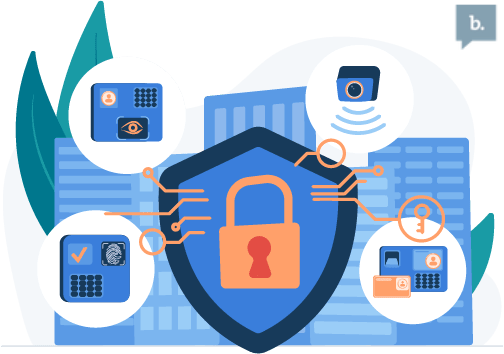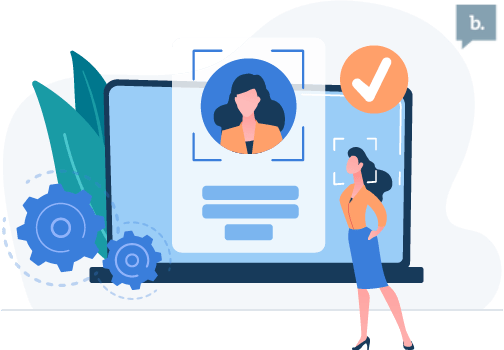In today's global technological landscape, information systems, their platforms, and corresponding user data are more sought after (by evildoers) and guarded (by companies) than ever. The good news is that most security breaches can be avoided with appropriate security controls, closely adhered-to user policies, and ongoing cyber hygiene. Taking the time and spending the resources to achieve this goal is paramount. Nothing can offer better return on investment as quickly or compressively as well-designed and properly utilized access controls.
What is access control?
Access control is a layer of information systems (IS), or information technology (IT), that determines who is allowed to access, view, and use company data and related resources. The "access control" part of this security layer is managed via authentication and authorization processes that are designed alongside company access control policies and practices that govern a company's systems and its data.
"Access control" can also refer to the security platform guarding a physical space, such as an office building, where access is limited to authorized personnel. Although there is significant overlap when it comes to comprehensive access control, as all modern access control systems are automized through IT platforms. Check out the best access control systems and providers to find the best security setup for your business.

How does access control work?
The basic premise of access control is that it uses certain login credentials, like usernames and passwords, personal identification numbers (PINs), or even biometric scans to grant access to certain systems or data to authorized users.
Most access control platforms also include multifactor authentication, which is a step of added security that requires multiple authentication methods to verify a user's identity before it grants access.
Think of access control as a large, impenetrable gate that keeps everyone out of your city. The only people allowed in through the city gate are those who can confirm their identity and that the sentry can confirm should be in the city. Those who lack the identification or the purpose for entering are not let in.
Editor's note: Looking for the right access control system for your business? Fill out the below questionnaire to have our vendor partners contact you about your needs.
The need for proper access control is increasingly important as small business cyberattacks get more costly each year. An Interpol report found that the costs associated with insider-threat breaches reached an average of $7.68 million in 2020. That number is expected to grow in the coming years. Not only is it difficult to catch cybercriminals, allowing them to move on to more targets, but a growing number of people around the world are working from home, which increases businesses' security vulnerabilities.

What are the types of access control?
Organizations typically select an area of access control based on their needs and requirements, which may include protecting customer data, supplier data, and industry or proprietary information that needs to be shared safely with outside parties. Here are four recognized types of access control.
- Discretionary access control (DAC): Access is given on an as-needed permission basis. For example, an employee may need access to a higher level of data for a certain period to complete a one-time project, or IT professionals may grant themselves discretionary access to correct issues, update systems or perform general system hygiene.
- Mandatory access control (MAC): A central administrator (such as the business owner in this case) sets the access levels based on preprogrammed settings. For example, the military regulates access rights based on different security levels.
- Role-based access control (RBAC): System administrators set permission levels that determine who can and cannot access the system and its data. There are almost always tiers of access based on levels of management and the necessary areas of data for each employee to do their job (e.g., a controller has access to all financial data but not IT user data).
- Attribute-based access control (ABAC): Access is granted based on various criteria that can change from system to system as needs present themselves. In most cases, it's based on environmental controls, such as time of day. For example, an employee who works the night shift may be allowed access at night, but not during the daytime.
Access Control Plans and Reviews
| Plan | Review | Role Based | Rule Based | System Type | Remote Management | Visitor Management |
| Kisi Plan | Kisi Review | Yes | Yes | Cloud-based | Yes | Yes |
| Johnson Controls Plan | Johnson Controls Review | Yes | Yes | Cloud-based | Yes | Yes |
| Isonas Plan | Isonas Review | Yes | Yes | Cloud-based and on-premise | Yes | Yes |
| SimliSafe Plan | SimpliSafe Review | Yes | Yes | Cloud-based | Yes | No |
| Vanderbilt Plan | Vanderbilt Review | Yes | Yes | Cloud-based and on-premise | Yes | Yes |
| Honeywell Plan | Honeywell Review | Yes | Yes | Cloud-based and on-premise | Yes | Yes |
| Identicard Plan | Identicard Review | Yes | Yes | Cloud-based | Yes | Yes |
| Brivo Plan | Brivo Review | Yes | Yes | Cloud-based | Yes | Yes |
What are the benefits of access control?
The benefits of strong and comprehensive access control points within your IT platform are many.
Physical security
Access control systems protect not only a business's cyber assets, but also its physical space. Keycards, code-guarded entry points, and restricted access to certain areas can be features of a comprehensive access control program.
Cyber-based sentry protections
The most fundamental provision of strong cybersecurity solutions (including access control) is protection against adware, ransomware, spyware and other malware. It allows you to control who gets in and who has access to what data, and mitigates the overall risk from potential threats that you may not even know about. With global ransomware costs expected to increase to nearly $20 billion by 2021, an access control program that defends your business against these threats is essential.
Good sentry-protected access controls also include features such as notifications when there are unusual upload or download volumes and actions of data or material.
Cyber hygiene and upkeep
Proper access control can even help with productivity and efficiency, as proper upkeep and hygiene prevents viruses that slow down your system and create longer-term vulnerabilities.
Secure remote access practices
Now more than ever, companies are asking their employees to access their corporate IT platform from anywhere and everywhere. Regardless of the access points or devices you use to access secure data remotely, strong access controls give you a safe vehicle to do so.

Good data takeaway practices
Remote access is important, but it's what users do with the data once they've extracted it from the system that some companies forget to guard. Comprehensive access control includes measures to encourage and enforce best practices like using the company's preferred browser, limiting downloads and print jobs, and putting watermarks on company documents.
Website crash prevention
Few things are more debilitating to a business than its website crashing. Customers can't contact or do business with you (at least not as easily) when this happens. Secure walls around your website and online sales systems will allow steady customer access, communication and business.
Secure and organized inbound data
When it comes to protecting customer and vendor data, you better have a detailed plan within your access control and cybersecurity platforms. These days, data breaches that expose customer information can entail a herculean cost and huge decline in customer confidence.
Protections against blacklisted URLs
No, we are not solely talking about gambling, pornography, and risky foreign-housed websites; comprehensive access control systems can block any URL you don't want your employees interacting with in any way, including websites that distract from their work.
Customer confidence
Your customers' confidence in your systems should be one of your highest priorities. Even the appearance of weakness or vulnerability within your cyber access controls can result in customers backing off your company or brand.
Robust access controls also prevent customers from experiencing a cyber breach by proxy (e.g., cyber thieves acquire customer data and can then hack into their financial accounts).

